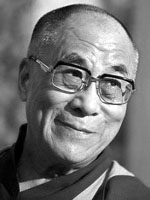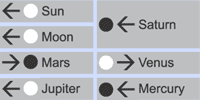Interesting facts
The Assistance (The White Moon, The White Jupiter)
The early childhood of the future of Dalai Lama took place in the atmosphere of hard work - his parents, like other residents of the village, were growing potatoes, wheat and oats. Later, he will do a lot of things to help the laborious fate of the poor peasants. His Holiness saw the primary task in the survival of the Tibetans in exile and the salvation of their culture. The settlements for the Tibetan refugees were founded for this purpose, and agriculture became their main occupation. The economic development and the creation of the system of education contributed to raising a new generation of Tibetan children up. These children knew their language, history, religion and culture perfectly. Over 200 monasteries were recreated in exile to maintain the extensive collection of teachings of Tibetan Buddhism (the basis of the Tibetan way of life).
The Mentor (The White Jupiter, The Black Sun)
"Dalai" means "the ocean" in Mongolian, signifying "The Great"; "Lama" in Tibetan is the equivalent of the Sanskrit word "guru" and has a meaning of "the teacher". Tenzin Gyatso was destined to become a teacher and preacher, and he devoted all his work and life to the realization of this higher mission, enormous in scope. Responding to a question about the source of his inspiration, he often recollects his favorite stanza from the work of famous Buddhist saint Shantideva:
As long as the space is working
as long as live alive,
Let me stay in existence
To pacify the pain inside.
He had a long and difficult path in self-improvement, and became a doctor of Buddhist philosophy. He also studied Sanskrit, medicine, logic, rhetoric, and many other sciences. As a Tibetan leader, Dalai Lama XIV travels the world, speaks to the Tibetans, teaches Buddhism, and practices a lot himself. Medicine, physics, economics and the environment as well as the protection of the rights and peacekeeping are among his interests. Dalai Lama XIV has many kinds of awards and honorary degrees from different world universities. His authority among Tibetans and Buddhists all over the world is incredibly high, and he is never tired of repeating that his current incarnation has three main responsibilities: explanation of human values, achieving harmony between different religions and assistance to the Tibetan people.
The spiritual and political leader (The Black Mercury, The White Jupiter)
Dalai Lama XIV was officially represented as the head of the Tibetan people in winter 1940. China annexed Tibet shortly thereafter, and province Lhamo came under control of the Chinese Communists. Dalai Lama, as the head of the Tibetan government, tried to negotiate with Beijing, hoping to avoid a full-scale war, but Chinese troops entered Tibet, and after nine years of useless attempts to negotiate with Chinese authorities, Dalai Lama went in exile to India. About 80 thousand Tibetans followed him. Dalai Lama lives in the Indian town Dharamsala, which is called "the small Lhasa" since 1960. The headquarters of the Tibetan refugee government is situated there. Dalai Lama led the measures aiming at the conservation of Tibetan culture. A system for teaching refugee children their native language and culture was created in India. Dalai Lama presented a draft democratic constitution of Tibet in 1963. It proclaimed freedom of speech, religion, gathering and movement.
The Universal love (The White Venus)
Dalai Lama sais that all major spiritual traditions, in spite of existing philosophical differences, carry a message of love. Speaking of morality, Dalai Lama primarily sees its origins precisely in love. "We need to develop the ability to love. The religions appeal to this. But usually, speaking about love, we think first of all about our nearest and dearest, about friends, and the feeling which appears becomes biased and mixes with affection. The genuine love, which is experienced in the theistic religions by God the Creator to his creatures is impartial. Such feeling may be extended even to the enemies. After all, speaking in the context of theistic traditions, our enemies are also God’s creations". The spiritual leader is convinced that we must love other people, be humble, respectful, because a person is a social being and love and mutual respect are very important in the society.
Breaking the stereotypes (The Black Mars, The Black Mercury)
Loyalty to the idea of absolute service to people could not prevent Tenzin Gyatso to withdraw from the stereotypes and to make a "revolutionary" breakthrough in the religious worldview, which seemed to be something settled and immutable for centuries. This innovation of His Holiness was manifested in relation to the science and modern civilization. The attitude of religion to science was quite categorical and caused a lot of difficulties earlier, but Dalai Lama's meetings with scientists helped to discover a substantial similarity between the Buddhist approach and modern science. Buddhism encourages the followers to expose everything to the research and analysis, to show a healthy skepticism and not to take anything for granted. Dalai Lama says "Whatever attractive form the information has, we have to subject it to deeper study and experiments. It is a very scientific approach".
The path of moral healing (The Black Saturn)
Dalai Lama, the great expert of human soul with all of its injuries and cracks, fears and passions, errors and vices, clearly sees not only the root causes and sources of infinite emotional suffering, but also the way to get rid of them. Being on a moral height, which is out of reach for most people, he is able to understand the imperfections of other people, to feel their pain, and to indicate a simple at first glance, but the only correct way to overcome it. His wisdom helps many people to activate latent spiritual powers and find the protection from personal weaknesses inside.
Dalai Lama encourages to start a battle with negative emotions, cultivate patience, modesty, and states that, with due respect, even great suffering can become a blessing. "Suffering can be a blessing in disguise. Overcoming it, we grow spiritually. We are forced to suffer and to feel anger and attachment by obscurations of the mind. We should try to fight the negative emotions", - he says. The spiritual leader of Tibetan Buddhism pays special attention to the understanding of patience as "an antidote to anger". According him, the mental suffering (as well as mental pleasures) is stronger than the physical. "Technically, the suffering of the body can be sustained. Suffering in the mind is produced by our obscurations, clinging to imaginary "I" and alleged permanence. If someone says something bad about you, do not be angry with him. If he says it because of malice or stupidity, he is an object for compassion himself", - said Dalai Lama.

